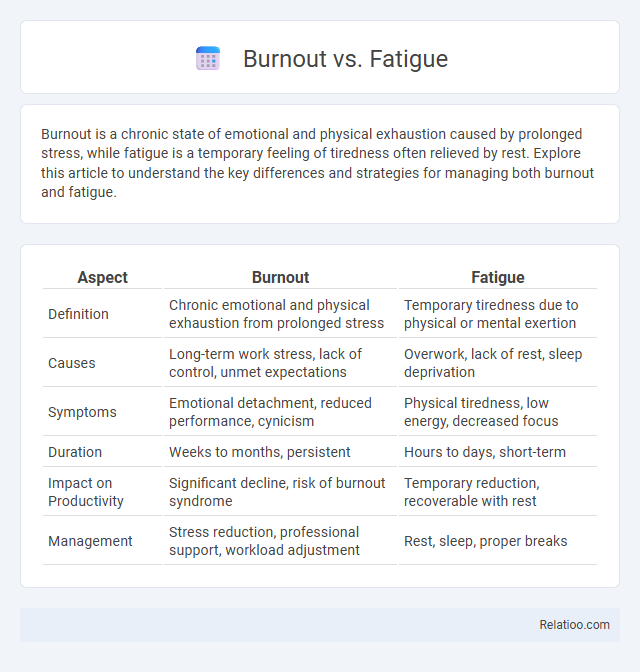Burnout is a chronic state of emotional and physical exhaustion caused by prolonged stress, while fatigue is a temporary feeling of tiredness often relieved by rest. Explore this article to understand the key differences and strategies for managing both burnout and fatigue.
Table of Comparison
| Aspect | Burnout | Fatigue |
|---|---|---|
| Definition | Chronic emotional and physical exhaustion from prolonged stress | Temporary tiredness due to physical or mental exertion |
| Causes | Long-term work stress, lack of control, unmet expectations | Overwork, lack of rest, sleep deprivation |
| Symptoms | Emotional detachment, reduced performance, cynicism | Physical tiredness, low energy, decreased focus |
| Duration | Weeks to months, persistent | Hours to days, short-term |
| Impact on Productivity | Significant decline, risk of burnout syndrome | Temporary reduction, recoverable with rest |
| Management | Stress reduction, professional support, workload adjustment | Rest, sleep, proper breaks |
Understanding Burnout and Fatigue
Burnout is a psychological syndrome characterized by emotional exhaustion, depersonalization, and reduced personal accomplishment, primarily caused by chronic workplace stress. Fatigue refers to a physical and mental state of extreme tiredness resulting from prolonged exertion or lack of rest, impacting overall energy levels and cognitive function. Understanding these differences helps in identifying targeted interventions, where burnout requires psychological support and workload management, while fatigue demands rest and physical recovery.
Key Differences Between Burnout and Fatigue
Burnout is a chronic condition characterized by emotional exhaustion, cynicism, and reduced professional efficacy, often resulting from prolonged workplace stress. Fatigue primarily manifests as physical and mental tiredness that can usually be alleviated with rest and sleep. Understanding these key differences ensures your well-being by recognizing when temporary fatigue escalates into debilitating burnout requiring targeted intervention.
Common Causes of Burnout
Burnout frequently results from chronic workplace stress, overwhelming workloads, lack of control, and insufficient recognition or support, distinguishing it from general fatigue that is primarily physical tiredness. Your mental and emotional exhaustion, reduced performance, and detachment often stem from prolonged exposure to these stressors rather than just temporary tiredness. Understanding these common causes helps in identifying burnout early and implementing effective recovery strategies.
Common Causes of Fatigue
Fatigue often results from prolonged physical or mental exertion, inadequate sleep, poor nutrition, and chronic stress, which collectively impair your energy levels and cognitive function. Unlike burnout, which is primarily linked to emotional exhaustion and workplace stress, fatigue has a broader range of causes including medical conditions such as anemia or thyroid disorders. Identifying and addressing these common causes of fatigue is essential for restoring your overall health and preventing progression to more severe states like burnout.
Physical and Emotional Symptoms
Burnout primarily manifests through emotional exhaustion, reduced motivation, and feelings of cynicism or detachment, while fatigue is characterized by persistent physical tiredness and low energy impacting daily functioning. Physical symptoms of burnout often include chronic headaches, muscle tension, and sleep disturbances, whereas emotional symptoms encompass mood swings, irritability, and difficulty concentrating. In contrast, fatigue's physical aspects involve body weakness and lethargy, with emotional effects limited to irritability and decreased alertness without the deeper psychological impact seen in burnout.
Impact on Work and Daily Life
Burnout significantly impairs your productivity by causing emotional exhaustion, detachment, and reduced performance, whereas fatigue primarily results in physical tiredness and temporary decrease in efficiency. Fatigue can often be relieved by rest, while burnout's impact on work and daily life requires comprehensive strategies to address chronic stress and maintain mental well-being. Understanding these differences helps you recognize when to seek professional support to prevent long-term consequences on career and personal health.
Diagnosis: Burnout vs. Fatigue
Accurate diagnosis between burnout and fatigue hinges on evaluating symptom duration, severity, and context; burnout typically manifests as chronic emotional exhaustion, cynicism, and reduced professional efficacy, whereas fatigue primarily involves temporary physical and mental tiredness. Diagnostic criteria for burnout often align with the ICD-11 classification as an occupational phenomenon, emphasizing stress related to work environment and prolonged work-related pressure. Fatigue diagnosis requires exclusion of underlying medical conditions and considers factors like sleep quality, physical exertion, and acute stress levels, distinguishing it from the more pervasive and psychologically driven nature of burnout.
Prevention Strategies
Effective prevention strategies for burnout include setting clear work-life boundaries, incorporating regular breaks, and fostering a supportive workplace culture to reduce chronic stress. Fatigue prevention focuses on ensuring adequate sleep, proper nutrition, and regular physical activity to maintain energy levels and cognitive function. Addressing burnout requires a holistic approach combining stress management techniques, workload adjustments, and access to mental health resources to sustain long-term well-being.
Effective Recovery Methods
Effective recovery methods for burnout emphasize psychological rest, stress management techniques such as mindfulness meditation, and professional counseling to address underlying emotional exhaustion. Fatigue recovery prioritizes physical rest, proper nutrition, hydration, and quality sleep to restore energy levels. Combining approaches like balanced work-life integration, regular exercise, and cognitive-behavioral therapy can help prevent burnout while alleviating chronic fatigue symptoms.
When to Seek Professional Help
Recognizing the difference between burnout, fatigue, and exhaustion is crucial for your mental health, as burnout involves emotional depletion and detachment, while fatigue primarily affects physical energy. You should seek professional help when symptoms like chronic tiredness, persistent lack of motivation, difficulty concentrating, or feelings of helplessness significantly impair daily functioning. Early intervention by a mental health specialist can prevent worsening conditions and provide tailored strategies for recovery.

Infographic: Burnout vs Fatigue
 relatioo.com
relatioo.com